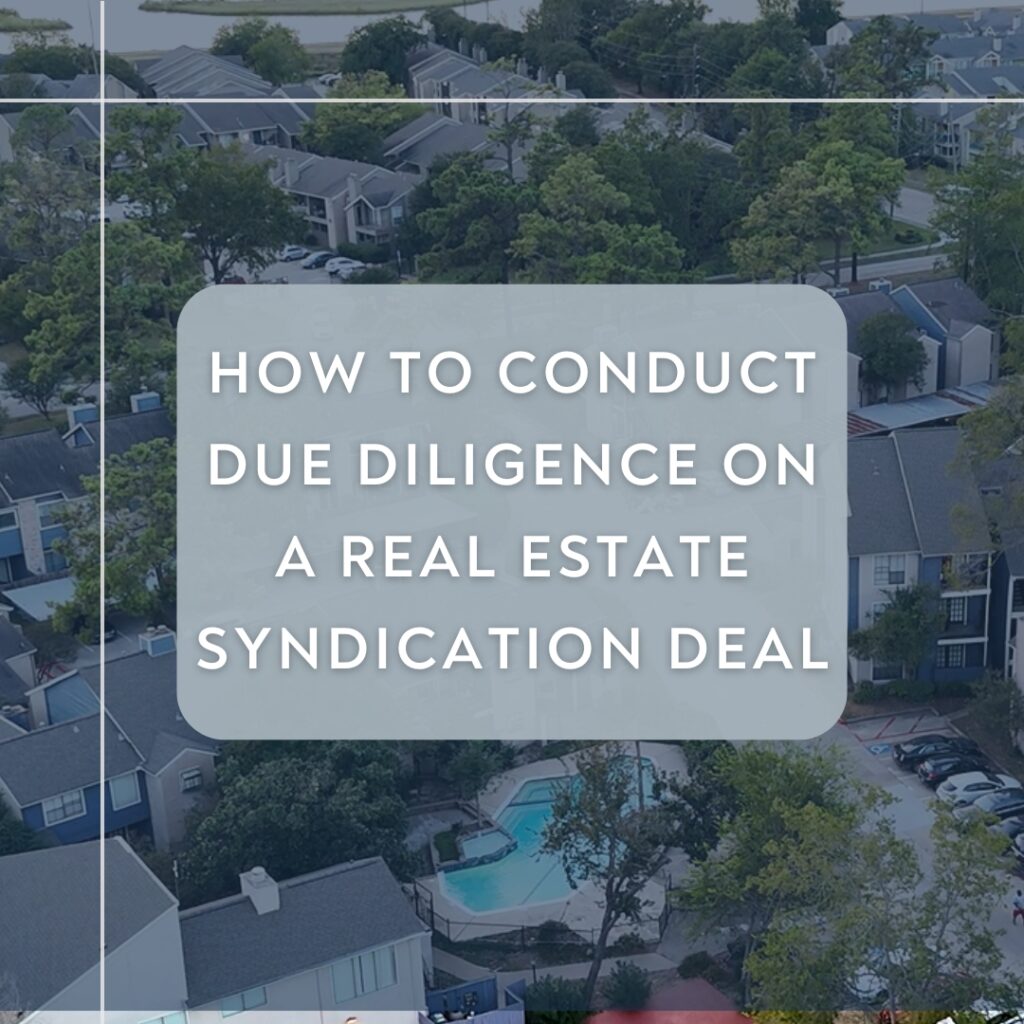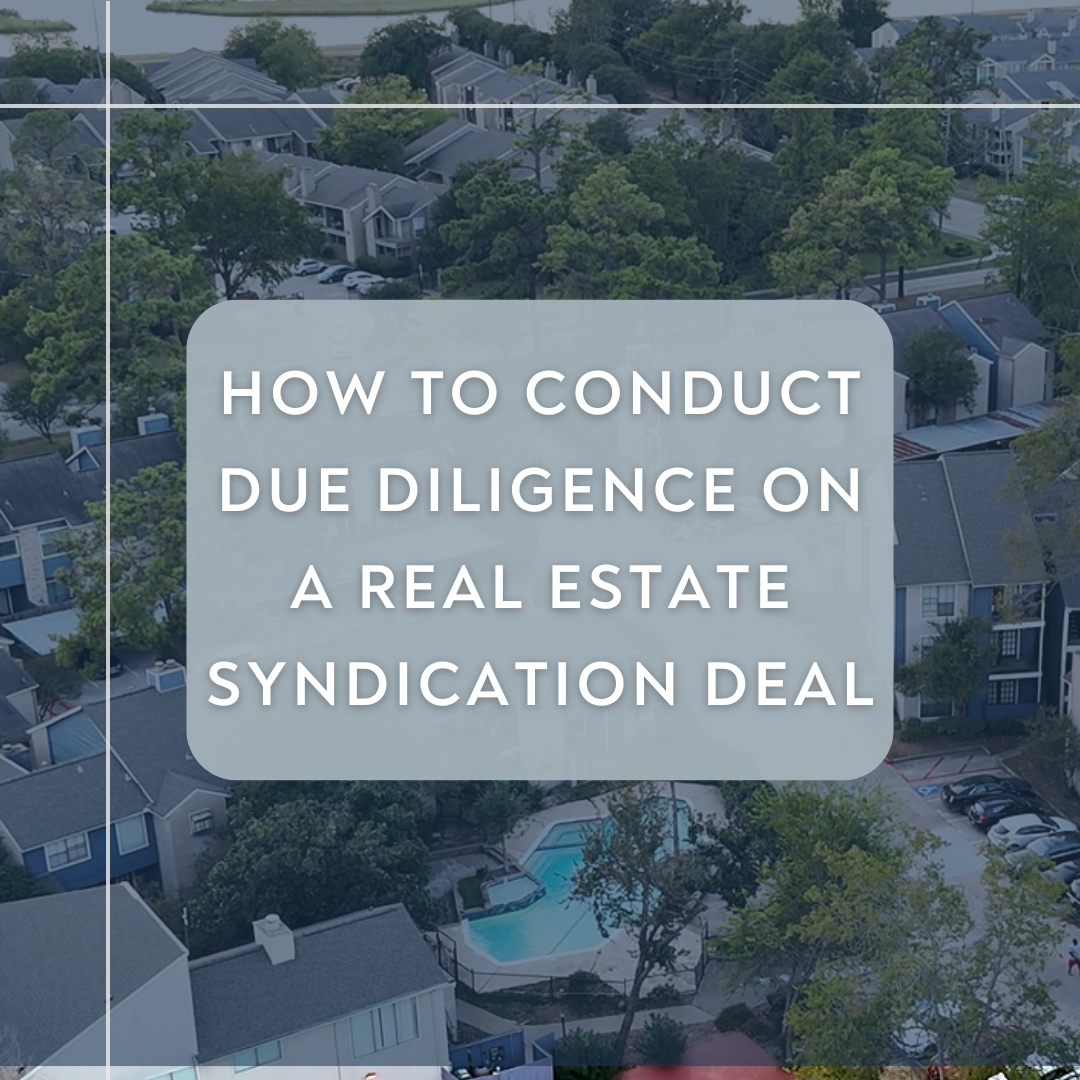
How to Conduct Due Diligence in Real Estate Syndications
Before investing in any real estate syndication, it’s critical to perform detailed due diligence to ensure the opportunity aligns with your investment goals and risk tolerance. Due diligence involves examining all aspects of the investment—from the people involved to the property itself—to make sound, informed decisions and avoid potential pitfalls.
In this blog, we’ll walk you through a step-by-step breakdown of the real estate syndication due diligence process.
Key Steps for Effective Syndication Due Diligence
1. Examine the Offering Documents
Start by thoroughly reading the investment’s offering materials, which typically include the Private Placement Memorandum (PPM), Operating Agreement, and Subscription Agreement. These documents outline essential details about the structure of the deal, the rights and responsibilities of the parties involved, the expected returns, and the associated risks. Be sure to carefully review the fee structure, return projections, and any clauses related to profit distribution or conflicts of interest.
2. Review the Sponsor’s Background
A syndication’s success often hinges on the experience and integrity of the sponsor. Investigate their history with similar investments, past performance, and ability to manage through market changes. Look for indicators of transparency, reliability, and consistency in delivering returns. Online reviews, past investor testimonials, and public records can provide further insight into their reputation.
3. Evaluate the Property Itself
Take a close look at the property or portfolio included in the deal. Consider the location, market demand, expected rental income, current and historical occupancy rates, and regional real estate trends. Consider hiring third-party professionals such as inspectors or appraisers to assess the asset’s physical condition and identify any necessary repairs or value-add opportunities.
4. Analyze the Financials
Scrutinize the deal’s financial projections and compare them against real-world market data. Consider whether the assumptions—such as rent increases or expense reductions—are realistic. It’s also important to stress-test the model and account for potential downturns.
5. Research Local Market Dynamics
Understand the economic and real estate conditions of the area where the property is located. Investigate factors like job growth, population trends, supply and demand, new construction, and historical rental trends. A strong local market can support long-term income and appreciation, while a weaker one may pose additional risk.
6. Perform a Legal and Regulatory Review
Engage legal professionals to review all legal documents of the deal. Ensure compliance with applicable laws, regulations, zoning ordinances, and property-specific legal requirements. Check for potential legal risks, such as environmental liabilities, title concerns, or unresolved litigation that could affect the property or investment.
7. Leverage Professional Expertise
Consult with professionals who can provide specialized expertise in areas such as legal matters, tax implications, property inspections, appraisals, and market research. Their insights and assessments can provide valuable information and help uncover any hidden risks or potential pitfalls.
8. Visit the Property and Speak with Key Players
If feasible, visit the property in person. Walk the grounds, tour units, and get a sense of the surrounding neighborhood. Speak directly with property managers, tenants, or community members to gather firsthand insight into how the property is operated and perceived. These observations can be invaluable.
9. Assess Risks and the Sponsor’s Mitigation Plan
Identify potential risks associated with the syndication and develop strategies to mitigate them. Assess risks such as market volatility, tenant turnover, potential changes in regulations, and financing risks. Work closely with the syndicator to understand their risk management strategies and evaluate the effectiveness of their risk mitigation measures.
Final Thoughts
Conducting due diligence is a vital part of the investment process in real estate syndications. By taking a structured approach—reviewing legal documents, vetting the sponsor, examining the property, assessing financial projections, and engaging professional support—you can better safeguard your capital and set yourself up for long-term success.
Comprehensive due diligence enables investors to recognize red flags, validate strong opportunities, and make confident decisions. Remember, due diligence is an ongoing process, and continuous monitoring of the investment is necessary to adapt to changing market conditions and safeguard your investment.
DISCLAIMER: This article is for informational and educational purposes only and does not constitute legal, tax, or accounting advice. You should consult your own professional advisors before making any investment decisions.
- All Posts
- blog






